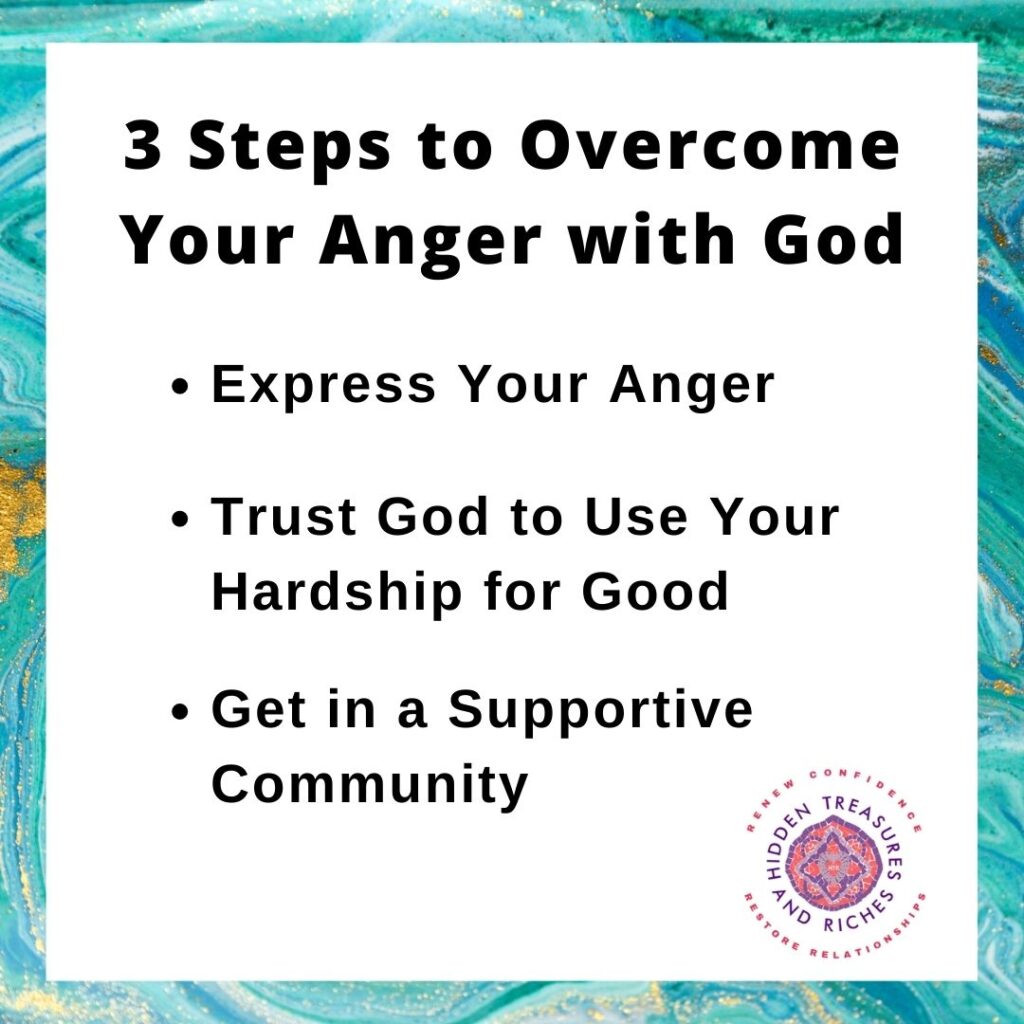What do you do when you are angry with God?
A Listening Heart

Take the first step towards healing and growth. Book your free call now and let’s journey together in faith and friendship.
Becky (not her real name) was mad at God in the last post. We looked at how she found freedom as she dealt with her anger toward God.
Like Becky, David was sometimes frustrated with God. Thankfully he didn’t stuff down his emotions, but instead, he expressed his deep frustrations in several Psalms.
Perchance, you too are angry with God and wondering what to do with that anger. Let’s look at how David overcame his anger with God and what we can learn from him.
What to Do When You Are Angry with God
1) Express your Anger
Even if you grew up thinking, being angry is wrong, God wants to hear from you. He can handle even the worst temper tantrum. Share exactly how you feel with him.
David cried out to God in despair when he felt like his life was full of trouble as he fled from Saul. He probably felt like he was carrying a ton of pain in his stomach while his enemies looked at him in arrogance. His honest conversation with God is an example that you and I can follow.
How long will you forget me, Lord? Forever? How long will you hide from me?
How long must I worry and feel sad in my heart all day? How long will my enemy win over me? Lord, look at me. Answer me, my God; tell me, or I will die. Otherwise, my enemy will say, “I have won!” Those against me will rejoice that I’ve been defeated. Psalm 13:1-4 (NCV)
Even if your life is full of trouble, you can trust God with your feelings and emotions.
Perhaps you lost your spouse, child, or a loved one to COVID-19, and you are angry and frustrated because God didn’t prevent their death. Rather than staying angry, release your feelings to God and tell him how the loss of your loved one has impacted you.
My soul is deeply troubled, and my heart can’t bear the weight of this sorrow. I feel so close to death. I’m like the poor and helpless who die alone, left for dead, as good as the unknowable sea of souls lying under our feet, forsaken by Him and cut off from His hand, abandoned among the dead who rest in their graves. Psalm 88: 3-6 (NCV)
David’s Psalms were letters sharing his raw, honest, and deep emotions with God. Like David, you could consider writing your own Psalm and letter to God. Share your feelings with him, list all your losses, and end with a prayer asking him for courage and strength.
As you lay down your pain, feelings, and losses, you too will experience God’s presence and peace.
I trust in your love. My heart is happy because you saved me.
I sing to the Lord because he has taken care of me. Psalm 13:5-6 (NCV)
Are you exhausted from carrying around a belly full of trouble and pain? How do you think sharing your honest feelings with God can help you?
2) Trust that God Will Use Your Hardship for Good
A belly filled with trouble and pain is not fun. Our God is a redeemer who is willing to give us courage and strength and his perspective. He wants to show us where he is at work in our difficult situations. He desires to connect your heart with his and give you beauty for your ashes.
Joseph’s brothers envied and resented him for being their father’s favorite. Their actions caused Joseph so much heartache for over 13 years. He was sold into slavery, wrongfully accused, and imprisoned.
Though Joseph felt alone, God was with him (Genesis 39:2, 21). God’s presence gave Joseph courage and strength throughout the hardships.
Only God’s presence gives us peace and strength to withstand adversity and suffering.
Our anger with God can serve a meaningful purpose. God will use our hardships for good if we are willing. Joseph received beauty for all his troubles and became the second in command in Egypt (Genesis 41:41). He learned endurance, self-discipline, humility, forgiveness, and dependence on God.
I have faced many adverse storms in my life, and as I trusted God with my feelings, he has used them to grow my faith and strengthen my character. I am still a work in progress as God continues to use hardships for my good and develop wisdom, patience, love, and compassion in me.
How could letting go and trusting God with your emotions benefit you personally?
3) Get in a Supportive Community
The other day I heard two Christian leaders on a podcast share about their battles with negative thoughts and insecurities. They both expressed how being in a supportive community helps them stay accountable, embrace hope, and know that they are not alone.
While running from king Saul, David surrounded himself with mighty men of valor (2 Samuel 28:8-17). He didn’t endure the struggle alone.
Once Becky plugged into a small group at her church, she found help in a community that encouraged her to be transparent with her struggles. She said, “sometimes I get a text or a word of encouragement from someone in my small group, and it is always what I need at the time.”
When we share our experiences with others in a safe community, God can use our experiences to bless them and us. May I encourage you to not go it alone and get in a supportive community with like-minded believers?
So, what do you do when you are angry with God?
You can overcome your anger with God. It’s ok to express your feelings and trust God to use the challenging circumstances for good in your life. Having a caring community around you will help you recognize that you are never alone. God is always with you through the storms of life.
Prayer: Lord, I recognize that it is wrong to stuff down my anger. Forgive me. Thank you for extending grace and mercy to me. Thank you for a new perspective. Fill me, Lord, with more of you. In Jesus’ Name Amen
Wondering how to let go of your anger or other negative beliefs holding you back to embrace new attitudes? Book a FREE Discovery Call today to discuss how I can help you.
You may also be interested in Are You Mad at God? and 10 Bible verses for when you are mad at God






